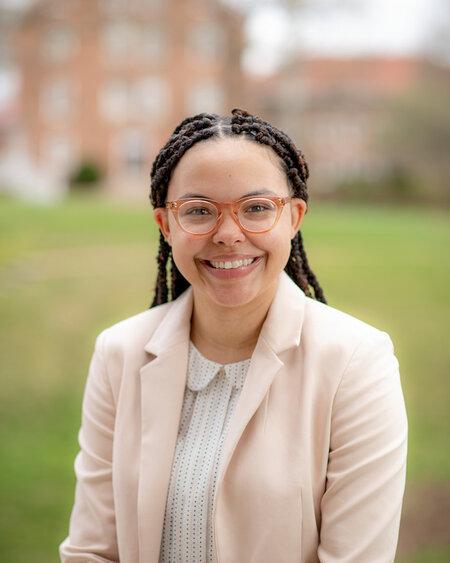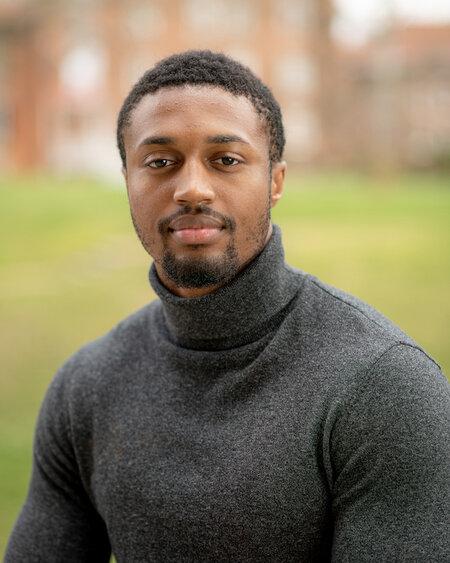MAPS benefits OHIO students seeking careers in the health and medical field
Through an experience with Ohio University’s chapter of the national Minority Association of Pre-Health Students (MAPS), Noël Gordon found her passion for working with kids and insight into her career path.
Gordon collaborated with The Center for Family Safety and Healing, an organization inside Nationwide Children’s Hospital, to plan an event intended to teach pre-health students how to recognize Adverse Childhood Experiences (ACE) factors in children. Knowing these factors can allow medical professionals to identify potential abuse or neglect in kids.
“I guess I always knew that I wanted to work with kids. I just needed to find the right opportunity to be able to actually learn that,” Gordon said.
The event reassured Gordon that she had chosen the right career path at Ohio University. She began college as a computer science major but discovered she wasn’t passionate about the subject. Gordon decided to explore the health field instead. Her membership in MAPS, a community of fellow minority students seeking health careers, allowed her to realize that she did not want to be a doctor. Now a psychology student, Gordon intends to pursue a career as a family psychologist.
“Being a part of MAPS gave me the clarity to figure out what I wanted to do. After I figured out what I wanted to do, it was a support system to help me get there,” Gordon said.
MAPS serves underrepresented students who plan to pursue medical school or health professions and allows them to access a professional network and social support system of their peers in health programs. The organization has different chapters at universities across the nation; Ohio University’s chapter was established in 2005.

The national organization is geared toward pre-medical students, but OHIO’s chapter was adjusted to accommodate all students who aim to go into health careers. Ohio University’s College of Health Sciences and Professions, one of the largest colleges on campus, offers students a wide variety of pathways to careers in health.
“I think it goes a long way to benefitting the students. Not just academically, but personally and professionally. It definitely is an opportunity for networking and building those connections on campus to faculty and to opportunities that are related to the field of study that you’re interested in,” said Shannon Nicks, assistant professor and faculty co-adviser for MAPS since 2017.
Ohio University’s MAPS chapter encompasses all minority identities – including people of color, LGBTQ+ individuals, immigrant students, women and first-generation students.
“On top of that, having that social network around you that can offer support, not only for the community as a whole but for people that you know are underserved and underrepresented, really goes a long way,” Nicks said. “Generally speaking, medicine, the STEM fields and social science fields are underrepresented when it comes to people of color, women and first-gen students. If we have more representation and more voices in decision-making, research and practical application around health and the improvement of health and the promotion of health equity for the future, then I think we can go a really long way in making strides.”
The co-presidents of the MAPS chapter at Ohio University, Noël Gordon and Jalen Warren, have both been involved with the organization for all four years of their college careers. Warren, a senior studying exercise physiology, transferred to Ohio University and knew that he wanted to join the MAPS chapter.
As co-presidents of the chapter, Gordon and Warren attend district and national meetings of the organization. They are able to network and connect with professionals and fellow MAPS students across the country.
“Being in this position has opened a lot of doors for me. It has given me a lot in terms of preparing me for my future, and also trying to help others who are on similar paths in their undergraduate careers,” Warren said. “My involvement with MAPS has connected me with other MAPS national members who have put me in contact with countless doctors who are now mentors, professional opportunities such as virtual scribing and volunteering, and lastly invites to meetings, conferences and forums I would not have known about without MAPS.”
Warren has also built relationships with deans and faculty members at various medical schools, such as the Ohio University Heritage College of Osteopathic Medicine, that will further assist him on his path to medical school.
The organization also serves as a support system within their Ohio University experience. Students are able to work together and support one another to be successful.
“I feel like having an organization like this allows minority students to have a community and feel like they are cared about, welcomed and thought about in terms of trying to help them succeed,” Warren said.

“When I’m able to surround myself with other students who are similar to me and trying to achieve the same goals, I am able to take their tips and advice. We are able to collaborate so both of us can get where we want to be,” Gordon said.
The students of MAPS are also committed to being change makers in the community. The group often hosts volunteer events and panels to address current issues.
“This is a group of students who are taking it upon themselves to recognize challenges and come up with solutions that they think they can address,” Nicks said. “Around the COVID-19 issues, for example, they took to social media. They put together social media campaigns to try to encourage appropriate health behaviors around social distancing and mask wearing among college-aged students. Finding organizations like this with peers who are walking that journey together, and with faculty advisers that can also help connect them to resources, is really beneficial because it allows them to be set up for success.”
Students can access more information about MAPS through the Bobcat Connect website. Stay up to date on the organization’s members and latest events by following them on Instagram @ohio_maps. The group also holds meetings on Tuesdays at 6 p.m.
